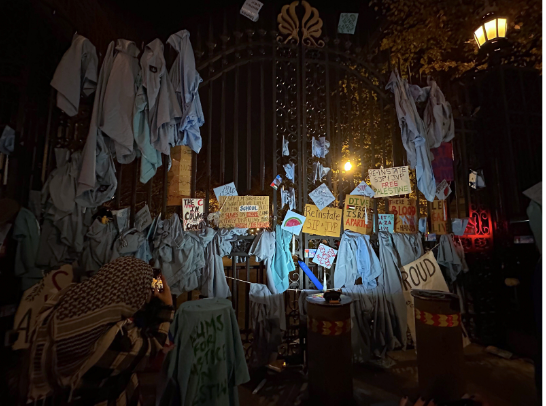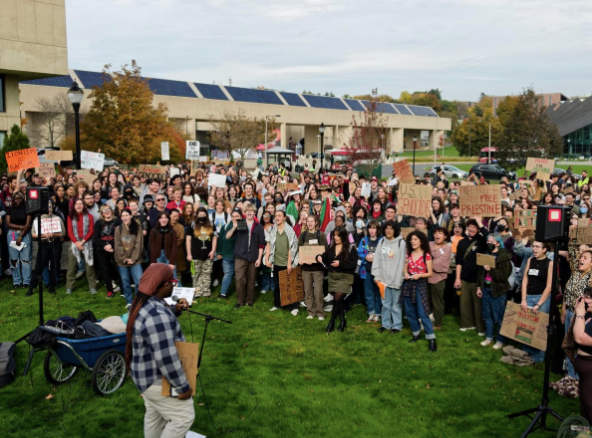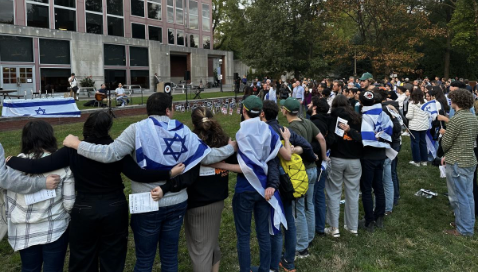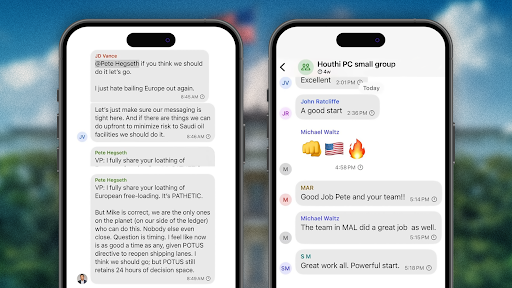Protests have erupted throughout college campuses nationwide since the Israel-Hamas war began in October. Although most protests have remained peaceful, clashes between Pro-Israel and Pro-Palestine protesters at the University of North Carolina and Indiana University have given administrators at other schools a reason to worry (NPR). Ramapo Junior Sarah Taouafe believes that “The ability to peacefully protest is one of the greatest things about participating in a democratic society like ours. […] I think it’s important to remember these truths despite any qualms an individual may have with a certain cause.” While every school has reacted differently to recent events, most protests have called for their universities to divest from –or end their school’s ties with– companies that fund the war.
Columbia University
Just two days after the clashes at UNC and IU, Columbia University closed its campus to the public as a protest by Students for Justice in Palestine (SJP) with Jewish Jewish Voice for Peace (JVP) and a counterprotest by Students Supporting Israel (SSI) were planned to take place on the same day (Columbia Spectator). These protests were arranged after an Israeli student was assaulted outside of one of their libraries (Columbia Spectator). On October 24th, the university updated its policies and seventeen days later, suspended SJP and JVP for a walkout they held in support of Palestine. Nearly a month later, 200 alumni of the group CUAlumni4Palestine stood outside hanging their caps and gowns on Columbia’s gates to protest the suspension of the student groups. They pledged to withhold any donations to the university until their demands of unsuspending JVP and SJP, as well as divestment from companies that profit from Israel were met (Columbia Spectator). When asked about the suspension of the student groups, Ramapo’s own English and Journalism teacher Mrs. Manzo responded, “I am quite shocked that college campuses would not support student justice and peace groups.” She adds, “It is unfortunate that our country has become so polarized that politics interfere with student groups fighting for justice and peace.”
University of Massachusetts Amherst
On October 25th, 500 students participated in a protest against the University of Massachusetts’ response to the ongoing conflict (Massachusetts Daily Collegian). A sit-in was held on the same day by Amherst students of SJP at the university’s administration building, in which 250 people participated. They demanded that UMass cut ties with companies such as Boeing and Lockheed Martin who provide artillery to Israel and stated that they would stay there until demands were met. After the building closed at 6 P.M, 57 students were zip-tied and led into police vans as they were arrested for trespassing (The Amherst Student).
Princeton University
Princeton’s student-led newspaper, The Daily Princetonian, stated that they have “remained relatively quiet” compared to students at other universities. Instead of protests, vigils were organized to stand with those who have lost their lives during this war. The Center for Jewish Life and Chabad Princeton held a vigil on October 12th where around 400 people gathered as they listened to songs in Hebrew, lit candles, and prayed. A day later, the Princeton students part of SJP held a public vigil where around 300 people brought signs, embraced one another and came together to grieve (Princeton Alumni Weekly).
What have schools been doing to deal with rising tensions on campus?
Many schools like Yale, Brown, and UC San Diego have shared mental health resources with their respective communities to offer them support as this conflict continues to unfold (UC San Diego Today and The Dartmouth). Additionally, Havard has established a task force to help students who had dealt with doxxing and harassment on campus after an incident where a bus digitally displayed pictures and names of students who signed onto a controversial statement regarding the events in Gaza (The Harvard Crimson). To create a safe space for students and professors to talk about the ongoing war, Dartmouth’s Jewish Studies, and Middle Eastern Studies held public events together to discuss and answer questions from students about the subject (ABC News).
Protests are continuing at College and University campuses nationwide as students continue to mourn the lives lost whilst simultaneously fighting until their demands are met.








